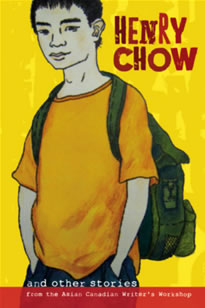Henry Chow is an unlikeable character. He is the embodiment of the clichéd high-school student: A class clown with a crush on Charlene, a “close-lip smiler, always trying to conceal her lavender braces,” who Henry doesn’t even think is “hot” because she’s flat chested. He’s that guy — the one who concludes a love interest is a “bitch” when he realizes his affection is unrequited.
Yet, Henry Chow is the perfect introduction to the Asian Canadian Writers’ Workshop (ACWW) anthology, Henry Chow and Other Stories. The collection of 13 short stories introduces readers to young Asian characters from around the world, from downtown Vancouver, to Calcutta’s Chinatown, to Montego Bay, Jamaica, exposing their similarities and differences. Henry represents a stereotype many hold about youth — immature, superficial, one-dimensional — acting as a contrast to the many thoughtful and thought-provoking characters that readers meet after him.
Each piece was selected by Ricepaper magazine and the ACWW, including established writers, such as Governor General Award winner Paul Yee, and emerging writers such as Toronto’s Annie Zhu who is currently working on her first novel.
Henry Chow and Other Stories explores many universal themes, including love, friendship and loneliness, riddled with stories you would expect to read in an anthology for young adults — first crushes, driving lessons, meddling parents. Yet these are tales are refreshing, often funny, and strangely reminiscent, likely to trigger readers’ own memories of youth, that reflects the high quality writing published by the ACWW and Ricepaper.
Among the anthology’s most likeable characters is Eriko, one of two love-struck teenagers in Hanako Masutani’s “Beached,” an ode to a first crush shared by two close friends. “Under my feet the sand — powdery at first, then cool and wet — felt firm and reassuring. With my best — and as yet unused — boy-propositioning cool, I stopped a few steps away from Rob Rondow and waited for him to toss the Frisbee. When he did, I tapped him on a bare bicep. ‘Hey,’ I said.” Readers can’t help but hope that Eriko, whose “face was plump like a baby’s” wins the affection of Rob Rondow over her friend Amy, with the “white-blonde hair.”
Many of the collection’s most memorable stories show a dark side to young adulthood, embodied perfectly in the anthology’s stand-out story, “Working the Corner,” by Vancouver’s Evelyn Lau.
“Hoots of laughter and the clatter of heels filled the night, while the air, weighted with marijuana and perfume until it thickened, stirred lazily,” writes Lau in her signature lyrical prose, reminiscent of her own collection of short stories, Fresh Girls and Other Stories. “On the corner across from [Shelley], a hooker danced for the passing cars, tottering on the edge of the curb, her head jerking back and forth like a puppet’s controlled by invisible strings. A street lamp illuminated a face caked with makeup,” she continues, luring readers in to the underbelly of sex work.
Many of the anthology’s young characters also live underneath the cloak of racism and violence, or sometimes both, including Jenny, the protagonist in Fiona Tinwei Lam’s piece, “Air,” whose overprotective mother remembers her own mother and two sisters smearing themselves with feces and urine to avoid being raped.
These complex themes that are often ignored in books for young adults, along with unique characters and some of the country’s best-loved Asian authors, as well as some who are undoubtedly up-and-coming, Henry Chow and Other Stories has something to offer to all readers of any age.—Jessica Rose
Jessica Rose is a regular contributor to rabble’s book lounge.




